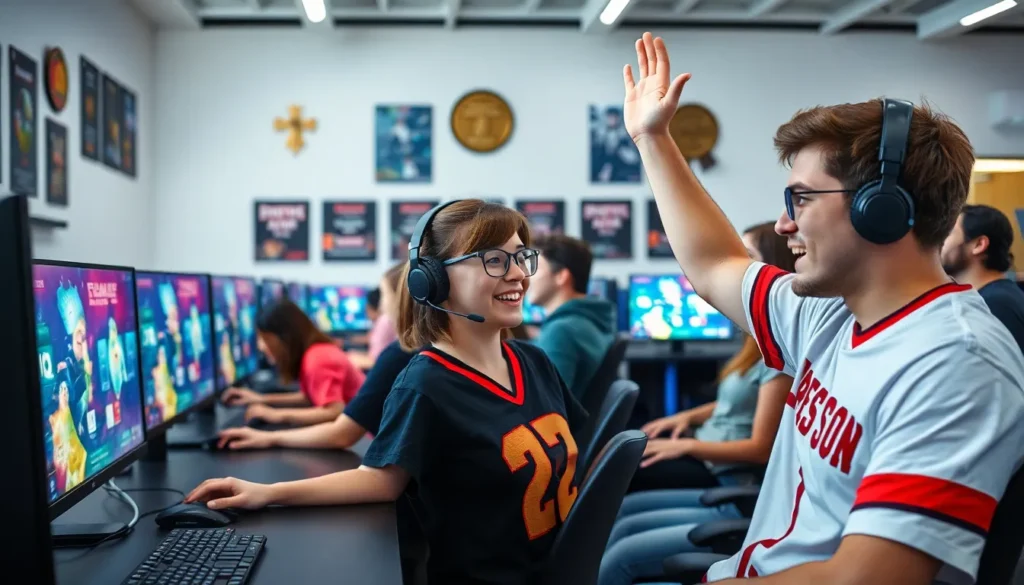Table of Contents
ToggleIn a world where gaming isn’t just a pastime but a legitimate career path, esports education is leveling up faster than a pro gamer’s reflexes. Schools and universities are jumping on the bandwagon, offering programs that blend academics with the thrill of competition. Who knew that mastering the art of teamwork and strategy could come with a diploma?
Understanding Esports Education
Esports education combines academic rigor with competitive gaming. Schools and universities increasingly recognize the value of integrating gaming into their curricula.
Definition of Esports Education
Esports education involves structured programs focused on competitive gaming. These programs teach various subjects, such as game design, event management, and marketing strategies. Students gain hands-on experience, developing skills that translate well into various industries. Certifications and degrees in esports management and gaming technologies signify academic recognition of this field. Institutions aim to equip students with both theoretical knowledge and practical skills essential for success in the esports arena.
Importance of Esports in Academia
Esports play a critical role in today’s educational landscape. They enhance engagement through interactive learning experiences. Students collaborate in teams, fostering important traits like communication and problem-solving. Additionally, the esports industry generates significant revenue, contributing to university funding. Many colleges now offer scholarships, making this competitive field accessible to diverse students. Programs promote inclusivity, allowing students from various backgrounds to participate and succeed. Emphasizing the relevance of esports helps legitimize gaming as a valuable career choice.
Curriculum Development in Esports Education

Curriculum development in esports education focuses on delivering relevant knowledge and skills necessary for the industry. Educators design programs that incorporate various disciplines to prepare students for diverse roles in gaming.
Key Components of an Esports Curriculum
Core components include game design, where students explore the creative aspects of developing games. Event management teaches practical skills required for organizing tournaments. Marketing strategies provide insight into promoting esports events. Additionally, business management covers financial and organizational aspects. Professional development emphasizes soft skills like teamwork, communication, and critical thinking, essential for success in esports careers.
Integration with Traditional Education
Integrating esports with traditional education enhances learning experiences. Schools incorporate esports into existing curricula, allowing students to apply technical skills in real-world contexts. Collaborative projects bring together students from different subjects, fostering teamwork. Furthermore, educators utilize gaming to teach subjects like mathematics and computer science, leveraging engagement to boost enthusiasm for learning. Such integration promotes inclusivity and provides students access to innovative educational pathways.
Career Opportunities in Esports
Esports education opens various career paths in a thriving industry. Roles provide opportunities for students to leverage their gaming skills in professional settings.
Roles in the Esports Industry
Positions in the esports industry include game developers, event coordinators, marketing specialists, and team managers. Game developers create engaging content that forms the backbone of esports. Event coordinators manage tournaments, ensuring smooth execution and fan engagement. Marketing specialists promote teams and events through innovative campaigns. Team managers oversee player performance and development, facilitating teamwork. Furthermore, analysts provide insights from gameplay data to enhance strategy. The variety of roles accommodates diverse interests and expertise.
Skills Developed Through Esports Education
Esports education fosters essential skills including critical thinking, teamwork, and communication. Students enhance strategic planning abilities by analyzing game mechanics and competition. They cultivate collaboration through team projects and competitive activities. Communication skills improve as students learn to articulate strategies and feedback effectively. Financial literacy may also develop while managing budgets for events and promotions. Many technical skills gain prominence too, with knowledge in game design and marketing strategies being significant. By fostering these competencies, esports education prepares graduates for a dynamic job market.
The Future of Esports Education
Esports education continues evolving, driven by emerging trends and new challenges within the industry.
Trends Shaping Esports Programs
Growing interest in gaming fuels the development of esports programs. Colleges prioritize comprehensive curricula that include game design and event management. Many institutions adopt state-of-the-art technology to enhance learning experiences. Increased collaboration with industry partners leads to valuable internships and networking opportunities. Gamification of education captures student interest, integrating competitive elements into traditional subjects. Additionally, evolving job markets require programs to adapt by incorporating essential skills like critical thinking, teamwork, and communication. Increased awareness of mental health issues within gaming prompts programs to include wellness components. Scholarships specifically for aspiring gamers also increase diversity within esports, making education more accessible to all students.
Challenges Facing Esports Education
Balancing academic rigor with gaming culture remains a significant challenge. Institutions often struggle to find qualified educators who understand both gaming and pedagogy. Ensuring that programs stay relevant necessitates continual updates to the curriculum, reflecting an ever-changing industry. Funding for esports programs can prove inconsistent, leading to difficulties in sustaining initiatives. Additionally, some skeptics question the legitimacy of gaming as an educational focus, causing potential barriers to institutional acceptance. Integrating esports into traditional education systems may also meet resistance due to varying perceptions of gaming in academic environments. As the industry grows, maintaining student engagement without compromising educational integrity presents an ongoing challenge for educators.
Esports education is reshaping the landscape of academic learning by merging traditional subjects with competitive gaming. This innovative approach not only prepares students for various roles within the thriving esports industry but also cultivates essential skills that extend beyond the classroom. As institutions adapt to the growing interest in gaming, they’re creating inclusive environments that support diverse student populations.
The future promises continued evolution in esports education, with a focus on integrating technology and fostering industry partnerships. By addressing challenges and leveraging opportunities, esports programs can maintain their relevance and effectiveness in preparing students for successful careers. The recognition of gaming as a legitimate academic pursuit signifies a transformative shift in how education and entertainment intersect.




